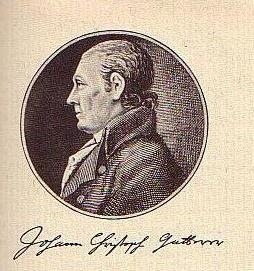Johann Christoph Gatterer facts for kids
Johann Christoph Gatterer was an important German historian. He lived from 1727 to 1799. He was born in a place called Lichtenau. His children also became famous. His son, Christoph Wilhelm Jacob Gatterer, studied how to manage a country's economy. His daughter, Philippine Engelhard, was a poet. Johann Gatterer was part of a group of thinkers called the Göttingen school of history.
Becoming a Historian
Johann Gatterer started his studies in 1747. He first studied theology at Altdorf. But soon, his interest shifted to history.
In 1752, he became a school teacher. He taught history and geography in Nuremberg. By 1756, he became a professor of natural history. Then, in 1759, he got a big job. He was named a history professor at the University of Göttingen. He stayed there for 40 years.
New Ideas About History
Gatterer was a leader in studying "universal history". This means looking at history as one big story. He worked with another historian, August Ludwig von Schlözer. Together, they helped create a new way to study history. This new way was called a "hermeneutical approach."
Gatterer believed history was more than just dates. He thought historical events were connected. He wanted to show why things happened, not just when. He used the phrase nexus rerum universalis. This means "a universal connection of things in the world." He wanted to find the links between all historical events.
Special History Studies
Gatterer also focused on special areas of history. These included genealogy (family trees) and heraldry (coats of arms). He also studied diplomatics (old documents) and physical geography (the Earth's features). He looked at these topics in a new, scientific way.
He shared his ideas in special journals. These were called Allgemeine historische Bibliothek and Historisches Journal.
Today, there is a special award named after him. It is called the "Johann Christoph-Gatterer Medal." It is given for great work in genealogy and heraldry.
A Look at Time
In 1785, Gatterer made an estimate. He thought that 4181 years passed from the world's creation to the birth of Christ.
 | Shirley Ann Jackson |
 | Garett Morgan |
 | J. Ernest Wilkins Jr. |
 | Elijah McCoy |


